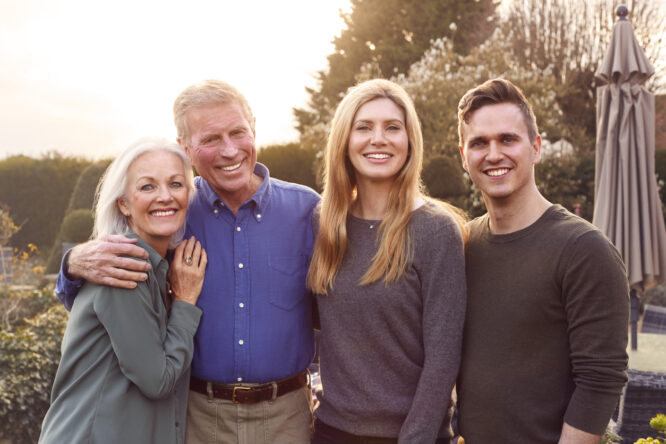Confidence doesn’t just shine through in the things people say — in fact, their actions tend to speak even louder.

When someone isn’t fully comfortable in their own skin, it shows in ways they probably don’t even realise. From body language to the way they react in social settings, the tiniest habits can (and often do) give them away. It’s not always obvious, but once you start noticing these little signs, you can tell when someone isn’t feeling great about themselves.
1. They fidget a lot.

Some people just have restless energy, but constant fidgeting — tapping fingers, shifting around, or messing with their clothes — can be a sign of discomfort. When someone’s feeling unsure of themselves, they struggle to stay still. It’s like their body is reacting to the awkwardness they’re feeling inside. Even in casual settings, they seem a little on edge. On the flip side, confident people tend to be more relaxed and grounded in their movements. When someone’s always adjusting themselves or can’t sit comfortably, it usually means they’re overthinking how they come across. It’s not something they do on purpose; it’s just their nerves showing up physically.
2. They can’t bring themselves to make eye contact.

Making eye contact isn’t always easy, especially when someone isn’t feeling great about themselves. If someone constantly looks away, glances down, or avoids locking eyes for more than a second, it can mean they’re feeling self-conscious. They might worry that holding eye contact for too long will make them seem awkward or exposed. Confident people don’t force eye contact, but they also don’t run from it. When someone keeps looking away, it makes them seem nervous or unsure of themselves. It’s not that they don’t want to engage — it’s just that making eye contact makes them feel too seen.
3. They say sorry way too much.

There’s nothing wrong with apologising when it’s actually needed, but some people say sorry for everything. They’ll apologise for asking a question, bumping into someone, or even just existing in a space. It’s like they feel guilty for taking up room or needing anything from anyone else. After a while, it starts to sound less like politeness and more like insecurity. Confident people own their actions without feeling the need to constantly apologise. If someone keeps saying sorry for things that don’t need an apology, it usually means they’re worried about annoying people. They don’t want to be seen as a bother, but in reality, their over-apologising can make them seem even less sure of themselves.
4. They laugh when nothing’s funny.

Nervous laughter is a real thing, and some people do it way more than they realise. Instead of reacting normally, they’ll chuckle awkwardly, even in situations that aren’t funny. It’s like they use laughter to cover up their discomfort or fill the silence when they’re not sure what else to do. They might think it makes them seem easygoing, but it often just makes their nervousness more obvious. People who are comfortable with themselves don’t feel the need to giggle their way through every conversation. If someone laughs a little too much at random moments, it’s usually because they’re not feeling totally at ease. It’s a habit that makes things seem relaxed and fun, but deep down, it’s just masking their insecurity.
5. They brush off compliments.

If someone can’t take a compliment without turning it into a joke or dismissing it, chances are they don’t fully believe it. Instead of just saying “thank you,” they’ll downplay it or make an excuse. They might say, “Oh, I just got lucky” or “Nah, it’s nothing special.” It’s like they don’t want to accept that someone sees something good in them. People who feel confident don’t need to overthink a simple compliment. If someone struggles to accept nice words, it usually means they have a hard time seeing those things in themselves. It’s not about being humble — it’s about not knowing how to take in positive attention.
6. They change their opinion to match the room.

When someone isn’t totally comfortable with who they are, they tend to go with the flow a little too much. Instead of saying what they actually think, they just agree with whoever’s talking. It’s not that they don’t have their own opinions—it’s that they’re afraid of standing out or saying the “wrong” thing. Confident people aren’t scared to disagree when it matters. If someone keeps switching their stance depending on who they’re with, it’s usually because they’re worried about being judged. They’d rather blend in than risk someone thinking differently of them.
7. They hesitate before speaking.

People who aren’t totally sure of themselves often second-guess what they’re about to say. They might pause too long, start sentences and stop midway, or backtrack on their words. It’s like they’re running everything through a mental filter, making sure it sounds okay before saying it out loud. Confident people trust their own thoughts enough to just say what’s on their mind. When someone hesitates too much, it suggests they’re scared of saying the wrong thing. They don’t want to sound stupid or be judged, so they hold back, even when they have something valuable to say.
8. They never want to be the centre of attention.

Some people don’t enjoy the spotlight, but there’s a difference between being reserved and actively avoiding attention. If someone shies away from speaking up, refuses to be in photos, or always keeps to the background, it’s often because they don’t want people looking at them. It’s like they’d rather disappear than risk being noticed. Being comfortable in your own skin doesn’t mean craving attention; it just means you don’t fear it. When someone is constantly dodging the focus, it usually means they’re not comfortable with how they come across. They might feel awkward, exposed, or just not confident enough to take up space.
9. They check their reflection constantly.

There’s nothing wrong with making sure you don’t have food in your teeth, but some people take it way further. They keep adjusting their clothes, fixing their hair, or sneaking glances at their reflection. It’s like they can’t relax until they’re sure they look “right.” Confident people don’t obsess over how they appear every second of the day. If someone keeps checking themselves, it’s usually because they’re overthinking their looks. They might not even realise how often they’re doing it. It’s just their insecurity showing up in real time.
10. They deflect attention away from themselves.

When a conversation turns to them, they find a way to shift it onto someone else. They might answer vaguely, make a joke, or redirect the focus back to the other person. It’s like they’re uncomfortable being seen too clearly, so they dodge the spotlight as fast as possible. Confident people don’t mind talking about themselves when it’s natural. If someone constantly redirects attention, it usually means they’re not fully at ease. They don’t want too much focus on them, especially if it means opening up in any real way.
11. They struggle to make decisions.

Even small choices like picking a restaurant or deciding what to wear can feel overwhelming when someone isn’t comfortable in their own skin. They hem and haw, ask for other people’s opinions, or say, “I don’t mind, you choose” way too often. It’s like they don’t trust themselves enough to make the call. Confident people aren’t afraid to just pick something and go with it. If someone constantly second-guesses themselves, it’s usually because they’re worried about making the “wrong” choice. Instead of owning their decisions, they overthink them until someone else decides for them.
12. They keep conversations at a surface level.

Some people love deep talks, but others avoid them like the plague. When someone isn’t totally comfortable with themselves, they tend to stick to safe topics: weather, TV shows, or general small talk. They don’t open up much, even when given the chance. It’s not that they have nothing to say; it’s just that sharing real thoughts or feelings makes them feel too exposed. They might worry about saying something personal and regretting it later. Confident people aren’t scared to let people see who they really are, but those struggling with self-doubt tend to keep things light and distant.
13. They guard their emotions.

Instead of reacting naturally, they keep their emotions tightly controlled. If something upsets them, they brush it off. If they’re excited, they tone it down. It’s like they’re always holding themselves back instead of just feeling things as they come. People who are comfortable in their own skin don’t feel the need to constantly manage how they’re perceived. When someone hides their emotions, it’s often because they’re scared of being judged. They’d rather seem indifferent than risk being seen as “too much.”
14. They compare themselves to other people a lot.

Instead of focusing on their own progress, they’re always measuring themselves against other people. Whether it’s looks, careers, relationships, or social status, they can’t help but wonder how they stack up. No matter what they achieve, they still feel like they’re behind. Confident people focus on their own lane rather than constantly looking sideways. When someone is always checking where they stand compared to everyone else, it’s usually a sign that they don’t feel good enough. Instead of appreciating what they bring to the table, they’re stuck thinking about what they lack.
15. They avoid being in photos or videos.

People who aren’t comfortable in their own skin often dread being on camera. They hide in group photos, make excuses to avoid being recorded, or immediately ask to see a picture so they can delete it if they don’t like how they look. It’s like they can’t stand seeing themselves the way other people do. Confident people don’t stress over every photo or video taken of them. When someone actively avoids being captured in the moment, it’s usually because they’re too critical of themselves. Instead of just enjoying the experience, they focus on how they’ll come off to other people — and that pressure takes all the fun out of it.




